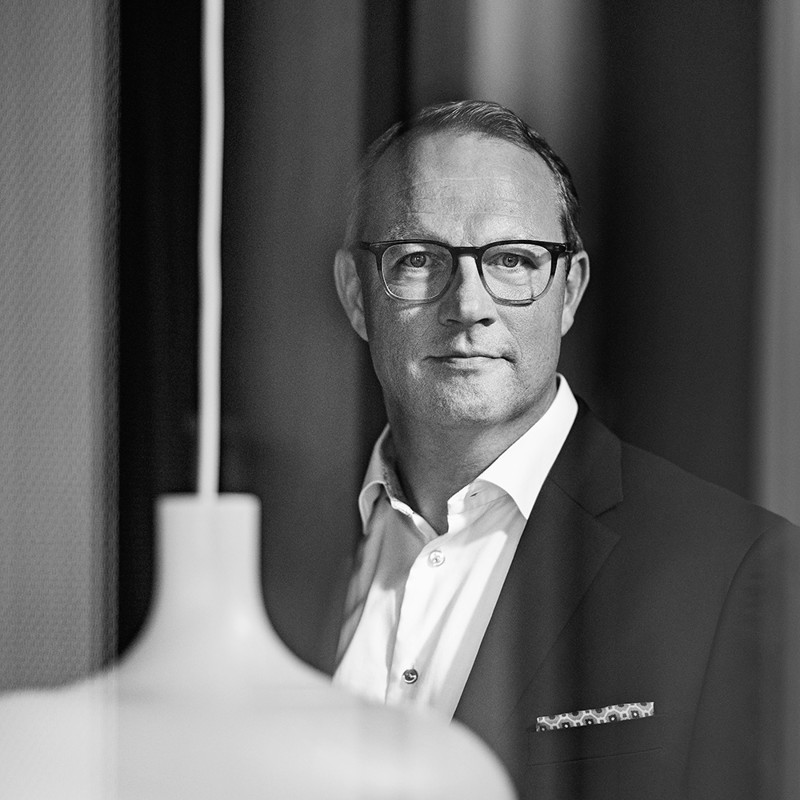The moving boxes had not yet been fully relocated to Stockholm when Allan Kjer, CFO of Team Olivia, was informed that the finance function needed to move back to Denmark. This initiated a fast-paced moving process, where he was aware from the start that an external perspective was necessary to ensure a sharp focus on the relocation, operational implementation and subsequent end-to-end optimisation.
When Allan Kjer was appointed CFO at Team Olivia, it happened in the midst of a transformation process. It was in the summer of 2023, and the group was in the process of consolidating support functions in a shared service center (SSC) in Stockholm, which had been ongoing for some time.
”When I was hired at Team Olivia in the summer of 2023, we were well underway with moving administrative tasks to Stockholm. Implementing this was crucial, as otherwise, we could not operate an efficient finance department in Denmark, and the Swedes could not run an effective SSC up there. The situation we were in, being halfway through the relocation, was unsustainable,” he says.
But half a year later, the task was turned upside down. The Swedish private equity firm that owned Team Olivia sold the Norwegian and half of the Swedish business. With that sale, the ambition for an SSC no longer made sense. Therefore, Allan Kjer was tasked with re-establishing the support functions in Denmark.
With a halfway completed move, it was a dispersed finance function that needed to be consolidated. Some tasks had been moved to Stockholm, and some remained in Denmark. Figuratively speaking, some of the moving boxes were still on the Oresund Bridge, making it difficult for Allan to gain a complete overview, while also creating uncertainty about the potential of the function he was to consolidate at Team Olivia's Danish headquarters in Herlev.
”Some parts of the function had not been seen or managed by us for years, so we had no idea of their condition. What standardisations and optimisations had they undertaken in Sweden? We did not know how much they had automated and digitised. We did not know how much was system-supported, and we also did not know what the potential of the department was. There were many unknowns," says Allan Kjer.
The need for fresh eyes
And how do you approach it when the relocation suddenly needs to be reversed, and you are tasked with building an independent support function?
For Allan Kjer, it quickly became clear that the process would be best handled with external perspectives. Not because he and his team lacked the necessary skills, but because it would ensure the quality of the task in both the short and long term.
”Of course, we could have traveled to Stockholm ourselves and brought everything back. But I felt there were too many unknowns, and we lacked an outside-in perspective to gain the right insights into the various possibilities and solutions.”
”If we did it ourselves, I knew it would not be documented thoroughly enough, and there would be a risk of tasks falling between two stools. Not many accounting staff are passionate about documentation.”
The need for fresh eyes was primarily a consequence of the task being twofold. Firstly, there was a relatively time-critical immediate task involving the actual relocation of the finance function. From the time the new task came into scope, there were only two months to move the tasks from Stockholm and implement them in the Danish finance function – the decision was communicated in March 2024, and the tasks needed to be anchored by the end of June.
”Before the summer of 2024 – in just a couple of months or three – the finance function needed to be moved back to Denmark. So, in principle, we had one month to understand what was there, then we had a month-end closure, which we conducted with them, and the next month-end was essentially our own. So it was crucial to find people who could roll up their sleeves and get to work immediately.”
And beyond the immediate relocation, there was also a longer-term task of assessing how the future function should be designed and structured back in Denmark. But first, an overview before optimisation.
”I needed an assessment of the opportunities for efficiencies both in the short and long term, so I could plan the resources I require – not just now, but also in six months and in the longer term. We are a growing company, so it was particularly important to understand the potential for improvements.”
Tempting with a revolution
Allan Kjer is a process-oriented CFO. He has previously helped build two SSCs, and with more than 20 years of experience in financial management, he sees optimisation potential in even the smallest details. Therefore, it was only natural to embark on a major transformation when Team Olivia suddenly needed to stand on its own and establish a full support function in Denmark.
”For example, we are still using the existing ERP platform with the current business processes and the existing system for supplier invoice management, and it could be tempting to replace them now that we have the chance.”
”I was aware that the finance function was not optimal, and I also knew how it could be improved. But I had to resist the temptation and instead wait until we were settled," he says, elaborating:
”I needed to hire a new chief accountant to build their own accounting department and be responsible for the function we had brought back from Sweden. And that person was not yet in place. So, it did not make sense to implement a lot of changes before the person who would be responsible for it was hired.”
Therefore, an interim solution was actually preferable for Allan Kjer until he had consolidated the function and gained a better overview of which profiles he needed to hire.
”It is clear that interim solutions are more expensive. However, it is not more costly than hiring employees whom I will not need in the long term and then having to let them go again.”
The interim solution was flexible and had been to Stockholm to understand the tasks, subsequently taking over their operation.

Allan Kjer, CFO in Team Olivia
The most important bothersome task
Whether it was a blessing or a curse for Allan Kjer that the moving trucks had to turn around before reaching Stockholm, and instead drop all the boxes off in Herlev, he contemplates for a while.
”It is not necessarily a gift to have the entire finance function consolidated in Denmark, because if it was an efficient SSC in Stockholm, they could also handle the task with obvious large-scale operation advantages. But now the situation ended up as it did, and therefore I took on the task," he says.
However, there are still some areas where it is nice to be at the head of your own department, and where the freedom allows for healthy changes. One such area is the segregation of duties, where it is easier to create a clearer division between tasks and functions when everything is consolidated under one roof.
Another area concerns what Allan Kjer calls "the most important bothersome task”.
”Process documentation! It is a task that is typically underestimated, but it is incredibly important. If we were to handle the project ourselves, we would not have been able to document the accounting processes we insourced. Of course, Sweden had documentation of the processes they carried out in the SSC, but not completely. Therefore, it became a crucial success criterion for the collaboration with Basico to ensure the necessary documentation of tasks and processes in a system. I knew we could not achieve this on our own," says Allan Kjer, also explaining that this was one of the reasons he wanted external consultants for the task.
”I know it will not get done if the task is given to our own employees, who are heavily focused on daily operations and may not necessarily see the value in documenting tasks, deadlines and processes,” he says.
About Team Olivia
Team Olivia is one of the largest private providers of care and welfare services in Denmark and Sweden, collaborating with more than 65 Danish municipalities to provide help and support to citizens across the country.
Since 2004, Olivia Denmark has been working purposefully to deliver quality of life and offer practical help and support to citizens who struggle with daily life due to illness, disability, brain injuries or other physical and mental impairments.
Olivia Denmark comprises more than 100 administrative staff and over 1,500 employees, including both skilled and unskilled workers, full-time staff and temporary workers.
Still in a transformation period
Today, Allan Kjer feels that the move was successful. And with his inherent process optimisation perspective, he naturally has a positive outlook on the future facing the finance department.
”I think it is worth noting that, under time pressure, we have successfully insourced the tasks. We independently closed the month of May on time, and now we are ready to create a robust, scalable setup for future growth.”
The transformation period has only just begun. Specifically, the scheduling system is facing a comprehensive update. It is the core of Team Olivia's business, as it forms the foundation for billing and payroll processing – two crucial key processes that must be well-managed to enable growth and future-proof the processes.
”It is an old, unscalable and essentially self-built system that we use for scheduling, so we have high expectations for the efficiencies it will bring when it is replaced and a new one is implemented. When we have an integrated system that can generate both invoices and payroll files, it will provide a significant reconciliation and quality advantage, offering new opportunities in both the support functions and operations.”
But fundamentally, the foundation is in place. A foundation that Allan Kjer also attributes to the work done in Stockholm. It is with this basis that optimisation for growth in the Danish market will now take place, the CFO explains. An optimisation that will be carried out in phases.
”The foundation for taking it further from here has been created by my colleagues in Sweden. So, it has been a healthy process to get it up there and take it as far as they could drive it. We have the foundation to move forward, so when the implementation in Denmark is fully in place, and we have a good sense of where to focus, we will just continue."

We connect the tactical and the operational
We always approach the customer's needs as changes that need to be anchored. Sometimes as interim services and sometimes as project services. However, the common factor is that it is always in collaboration with the customer.
Do you need help with an interim solution or a change process? Then contact us for a non-binding conversation.

 en
en
 da
da



